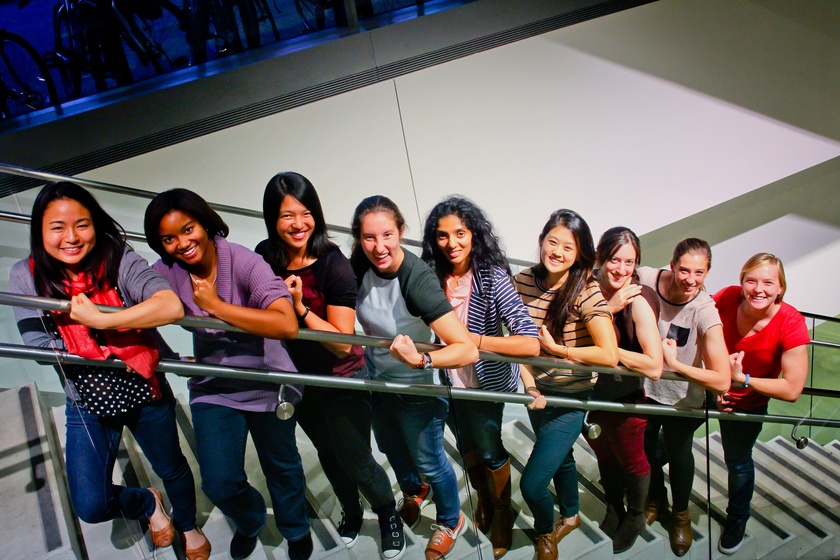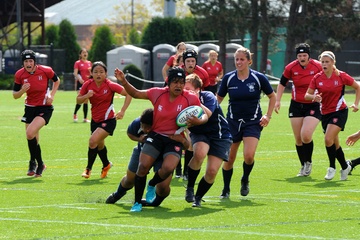Cayla C. Calderwood ’14 had been playing wing for all of two minutes when the other team punted straight at her. After a moment of panic, she caught the ball, and then, she explains, “Everything sort of went blank. It was as if it was a giant game of octopus.”
Calderwood was a freshman, having joined the rugby team only two weeks prior, when she was promptly “wiped out by one of their best tacklers,” she says, and got immediately hooked on women's rugby.
First game stories like this tend to be the norm rather than the exception for the Women’s Rugby seniors. Despite their remarkable athleticism (most played two or three sports in high school) none had any experience playing rugby before joining what was then a club team. As a result, freshmen would be thrown into games with just enough knowledge to stay safe. They’d figure out the “game of octopus” as they went.
Three years later, it’s hard to recognize those freshmen in the women who played on a National Championship-winning squad in 2011, guided their team to varsity status over the past two years, and recently won their first Ivy League Championship.
Take, for instance, co-captain Xanni F. S. Brown ’14. She started playing rugby in October her freshman year, by December was invited to the under-20 national team tryout camp, and by summer wore a USA jersey in games against British, Canadian, and South African squads. She’s the first Radcliffe rugby player to ever play on the under-20 US national team.
Then there’s Ali R. Haber ’14. Co-captain since her sophomore year, Haber helped direct the discussions with the athletic department that led to the team’s first varsity season this fall and steered her squad through the rewarding and challenging transition.
The team had to up practices from two to five times a week, add new strength and conditioning training, switch coaches, and (most contentiously) change their name from Radcliffe to Harvard. Becoming varsity has brought the players increased University support, but it has also demanded far higher levels of commitment both on and off the pitch.
The team didn’t even know of the impending promotion to varsity—it seemed like the talks with the athletic department had stalled until teammates received a surprise email announcing the change over the summer in 2012.
“We found out from the press release,” remembers co-captain Brandy A. Machado ’14. “Our coach found out from the press release.” Some of the players thought the email was a prank from the Men’s rugby team.
But pranks aren’t really the seniors’ style. When discussing rugby culture, they’re more likely to point to exceptional levels of support, even beyond those of other sports teams they’ve played on.
“Because it’s so physical,” Haber explains, “you sort of form this more intense bond with your teammates because you’re literally protecting them with your own body on the field.”
While the sport itself encourages this community—it’s traditional for teams to “social” with each other over pizza after games—the seniors have taken extra steps to promote it.
As they head to Nationals this spring for a chance to reprise their 2011 victory, the team will be singing a hymn, an old tradition that’s been reinstated this year. It goes: “We don’t play for admiration. We don’t play for victory. We just play for recreation. Fifteen fit señoritas are we. Here’s to [opposing team]. Here’s to [opposing team]. We will play you evermore. We will play you evermore.”
The seniors may have outgrown the times when they would gather outside Grays before walking over to practice, but their legacy doesn’t just point forward to championships and greater athletic prowess. For Rachael X. Y. Foo ’14, the hymn “reminds every member on the team that even though we’re varsity now, we’re Harvard now, we’re still Radcliffe underneath.”



